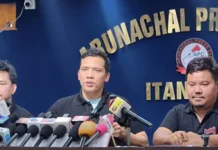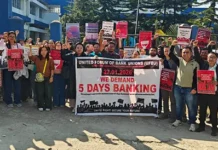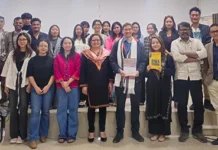Flights Of Fantasy
[ M Panging Pao ]
Democracy is defined by many as ‘Government of the people, by the people and for the people’. It means that every citizen has a role in governance and upliftment of society. It is the people who hold actual power by the power of ballot. It means that common citizens ultimately control the politicians, bureaucrats and judiciary. Democracy also means “people power”.
When elected representatives, bureaucrats, police and judiciary start failing common citizens, common citizens start taking law into own hands to ensure justice. When the democratic set up/system fails to deliver, citizens take over the role of judiciary, police, bureaucrat and execute instant justice.
There have been few glaring examples of instant public justice in Arunachal Pradesh and North East during recent months and years. Recently, on suspicion of rape leading to death of a 5 year old girl student, about 1500 people reportedly ransacked Tezu police station, broke the cell; the 2 suspects were dragged out and lynched on 19 February 2018. This was followed by an irate mob attacking and vandalising Yingkiong police station on 20 February based on reports that a 6 year old girl was raped at a private school.
Earlier on 5 March, 2015 at Dimapur, 7000-8000 people dragged a man detained under suspicion of rape out of Dimapur jail, paraded him naked and beat him to death in full public view. Similarly, there have been sporadic cases of lynching of suspected cattle thieves in Assam.
What was more worrying and disturbing was the fact that these cases of lynching were celebrated in social media as “Mob Justice”!
However, these cases have interstate and inter caste repercussions as seen in the Dimapur lynching case. It takes a minor spark and a few instigators to lead to a major interstate or inter caste/tribe backlash. In addition, many innocent citizens may be lynched based on rumours and hearsay without going through a fair trial to establish their guilt or crime.
The other news about public ire is regarding delay in infrastructure projects. Recently the public of Upper Subansiri district decided not to participate in any electioneering process until the Trans-Arunachal Highway is constructed. The huge rally was joined by many local organizations. This unique form of protest has been seen in a few constituencies of our state wherein the local citizens have protested against government apathy adopting a ‘No Road, No Votes’ principle. It seems that slowly but gradually a movement is beginning against institutional corruption and poor governance. The question is, ‘Will such movements sustain in Arunachal Pradesh?’
We sincerely hope that better governance is displayed to ensure that common citizens do not take law into their own hands and start delivering instant justice. We should avoid turning into a Banana Republic! (The contributor is retired Group Captain, Indian Air Force)





